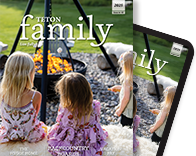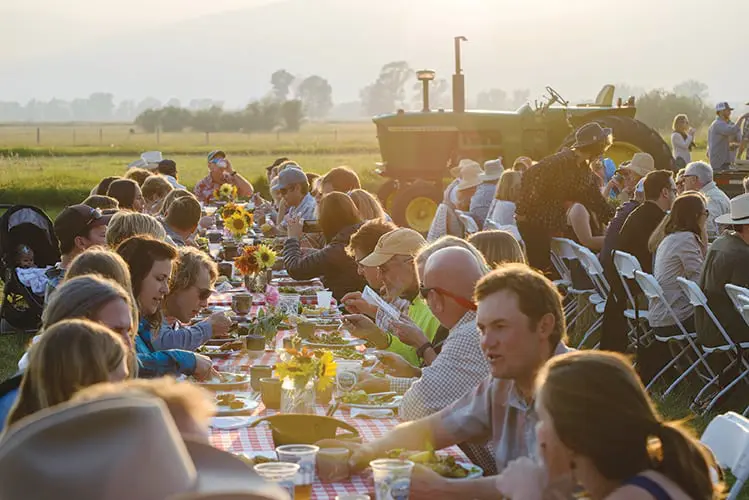By Cate Stillman // Photograhy by Price Chambers
—
Can a community develop a strong immune system?
And, if so, can ours?
These are questions we ask ourselves in the new age of COVID-19 and as travelers from viral-infected areas move in and out of our valleys.
Some communities were hit harder than others in terms of severity of symptoms and death, while others remained fairly unscathed. Factors of healthy living such as time spent in nature (increases vitamin D), exercising rather than smoking (builds strong lungs), and eating real food versus fast food (achieving a healthy body weight) separated resilience from vulnerability. As Hippocrates taught almost 2,500 years ago, “It is more important to know what sort of person has a disease, than to know what sort of disease a person has.”
The Bodily Ecosystem
An ecosystem is a mix of interconnected relationships, interdependent upon each other. The human body is an organism that acts like an ecosystem—all organs, tissues, and cells are connected and dependent on one another. If a person develops resilience to viruses and all other sorts of hardships, then the opposite is also true. As terrain theorist Antoine Béchamp taught, “Germs seek their natural habitat—diseased tissue—rather than being the cause of diseased tissue.”
Resilience is the capacity to recover quickly from difficulties and is built by prioritizing long-term goals, like health, over short-term desires, like eating donuts. When you exercise in the morning, rather than eating donuts, you build resiliency. When community leaders encourage residents to participate in immune-strengthening activities, such as exercising outdoors and building relationships with local food producers, our population—or community immune system—becomes stronger.
My time spent as a holistic medicine practitioner for almost two decades has taught me that some people empower themselves to create the body and life they want, while others do not. Some people respond to the natural stress of aging, a failing immune system, or mounting stress with a “pill and a bill” mentality, thus needing an outside agent to fix their unsound choices. Studying why certain populations are healthier than others, or how certain populations age well and remain in good health—despite the continual proliferation of virus adaptation—provides actionable insight into a healthier community immune system.
How do we grow a community’s resilience?
The COVID-19 pandemic taught us that we rise and fall together, right? Then, with a few mindful measures we can protect ourselves holistically from whatever nature throws at us.
Change your response to stress.
Our ability to choose our response to new stresses—individually and communally—is key, as stress, when handled in a way that quells the excitement of the nervous system, can generate adaptation and positive change. A strong immune system relies on a strong nervous system and a positive mind.
Yogis know this and invest time each morning developing their nerves and reconditioning mental stress through deep breathing practices. In winter, these practices are done outside to develop even stronger nerves. When you use your lungs to calm and direct your mind and optimize your emotions, you generate a relaxation response in your body. This cultivates an adaptive response to stress.
If a community can train itself to respond to stress without automatically deferring to “fight or flight“ mode (a default response we’re seeing in COVID times), then that community can become more resilient to its stressor.
Connect locally to diversify your microbiome.
A resilient immune system relies on diversity, specifically a diversity in the body’s microbiome (its good bacteria). In 2012, the National Institutes of Health’s Human Microbiome Project mapped the bacteria of human bodies. A healthy community of bacteria is found throughout the body and lives primarily in your skin, your lungs, and your digestive tract. In fact, microorganisms in the human body outnumber human cells at a 10:1 ratio, yet make up only 1 to 3 percent of your body’s mass, according to the National Institutes of Health’s (NIH) “Role of viruses in human evolution.”
Scientists are working to discover the relationship between microbiota and its role on viral evasion. What they have found is that chronic negative stress increases the fight or flight response, generating chronic inflammation and eroding the microbiome alongside our bodies’ adaptive immune system. Additionally, as stated in a 2017 study published by Nature Reviews Immunology, hyper-sanitary habits, like using hand sanitizer, combined with the overuse of antibiotics and the Standard American Diet (SAD diet), all destroy the microbiome, which can lead to the onset of autoimmune diseases. Lastly, living in isolation can weaken your adaptive immune system due to a lack of exposure to good germs. However, if you are high-risk, isolation is a good short-term measure to ward off viruses while building your microbiome.
“In fact, petting your dog, then picking your nose, then holding your child’s hand, actually increases the diversity of your microbiome and strengthens your immunity.”
Conversely, our adaptive immune system becomes stronger and more intelligent with exposure. In fact, petting your dog, then picking your nose, then holding your child’s hand, actually increases the diversity of you microbiome and strengthens your immunity (according to a study done by the University of Colorado). Exposure to pathogens, such as viruses, bacteria, and parasites is known to be important in preventing autoimmune diseases. When you pet your neighbor’s dog or your child drinks from her friend’s water bottle, you start to share good germs regionally.
Establish your sense of Self.
Ayurveda—a 5,000-plus-year-old Indian holistic health science—has terminology we don’t have in our language. The Ayurvedic definition of health, which is reliant on a healthy immune system, is both holistic and specific:
“One who is established in Self, who has balanced doshas (primary life force), balanced agni (fire of digestion), properly formed dhatus (tissues), proper elimination of malas (waste products), well-functioning bodily processes, and whose mind, soul, and senses are full of bliss is called a healthy person.” — Sushruti Samhita.
This definition has stood the test of thousands of years.
Today, the importance of having healthy digestion and waste elimination, as well as a clear mind, is the key to surviving a new virus. Being established in your absolute nature—or Self—means you are firmly rooted in your purpose and your needs today. To put this into practice, take a few moments in the early morning to reflect on the day you want to have and the habits you want to cultivate. Then, at the end of the day, reflect on your purposes and how you did. Mentally rehearse how you want things to go tomorrow.
After the Cold War, global military theorists predicted the world would become increasingly VUCA: volatile, uncertain, complex, and ambiguous. The same thing is happening during the COVID-19 pandemic, as we’ve witnessed the disruption of both our daily life and a global economy. VUCA isn’t predicted to go away. So, given what is, how do we adapt to become more resilient?
The seat of power for a strong immune system is the power of choice. You get to choose how you form your bodily tissues and how well your body eliminates waste. You choose what feeds your mind, your soul, and your senses. The more you see yourself as an interconnected microcosm and our community as an interconnected macrocosm, the more aware you become of your place in the web.

